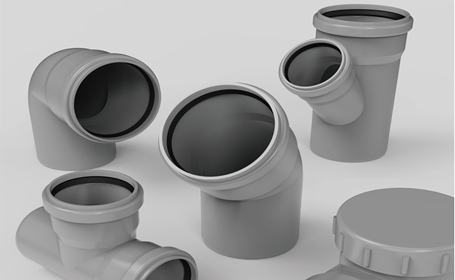

① Pipe cutting: according to the use requirements, after measuring the appropriate length, the required pipe can be cut by hand or machine. When cutting, keep both ends vertical and flat, and use a file to cut Deburring and sharp edge, but the chamfer should not be too large.
② Bonding of pipes and fittings: before bonding, trial assembly must be carried out, installation position must be determined and marked, length of inserted pipe end (socket depth + 10mm) and inner wall of socket of pipe fittings shall be cleaned,Then wipe with cotton yarn stained with acetone. After acetone volatilizes, evenly brush the adhesive on the outside of pipe end and inside of socket. It should not be too thick, but it should not be missed. Insert after painting and rotate. To the ideal combination angle required for installation, make all the pipes inserted into the socket, fix them by themselves after about 2 to 3 minutes, and wipe off the excess adhesive overflowing from the bonding place to keep the pipe clean. Now cut.Do not force to open or rotate the direction, otherwise it will cause leakage. The adhesive component shall not be subjected to external force within 1 hour, and shall not be watered within 24 hours. The test can be conducted only after the curing time is completed.
③ The pipeline installation must have a reliable seal to ensure that there is no leakage in the process of use. Fixing devices (pipe clamps) shall be installed every 1.5m to 2.0m.
④ Because the plastic pipe has certain plasticity, when the horizontal pipe is installed, the bracket or elevator is set every 0.6m to prevent the plastic pipe from deformation and affect the use.
⑤ The water supply pipe shall be far away from the heat source, and the clear distance between the riser and the stove edge shall not be less than 400mm, and the clear distance between the riser and the heating pipe shall not be less than 200mm.
⑥ After construction, the pipe can be sealed with soil only after passing the pressure test.
⑦ Please refer to the relevant construction specifications of the Ministry of construction for specific installation and use.